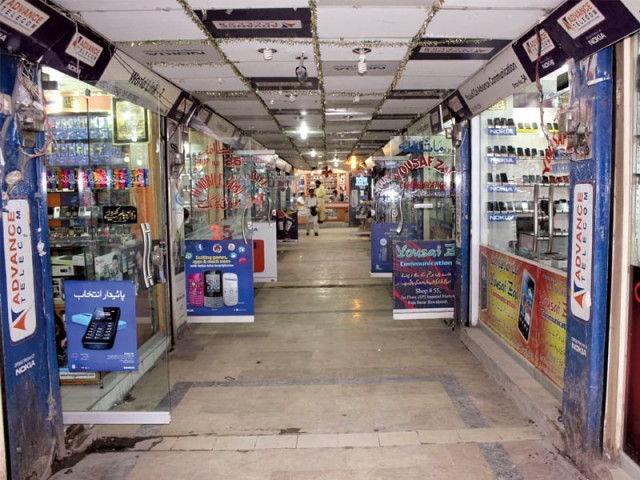End of an era: Pindi’s Imperial Market is going cellular
Cell phone boom has transformed the once bustling electronics and video market .

First floor of Imperial Market is now completely occupied by wholesale mobile phone shops. It used to be a hotel some years ago. PHOTO: WAQAS NAEEM/EXPRESS
For 22 years, Imran Ghauri had been selling electronic items at a store in Rawalpindi’s Imperial Market. But six months ago, the 43-year-old shopkeeper was forced to make a move so many of his fellow shopkeepers have already made over the past five years.
People have started buying either LCD and LED TV sets or the cheap Rs3,000 device that allows computer monitors to receive cable transmission, he said.
“The business of selling old (Cathode Ray Tube) TV sets is over, so I have shifted to this small business of selling mobile phones,” he said.
Ghauri still retains some of the old TV sets in one corner, but a glance around the narrow alley past his shop, and all you see are mobile phones.
Tucked away in a cramped three-storey plaza near Fawwara Chowk in Raja Bazaar, the Imperial Market was once considered one of Pakistan’s finest electronics and video markets -- equivalent of Karachi’s Rainbow Centre or Lahore’s Hall Road. Throughout the ‘90s, it was the place to be for buyers of top-of-the-line TV sets, imported and sometimes smuggled VCRs, VHS tapes and later digital discs and DVD players.

Khan DVD store is shifting into a cell phone shop. PHOTO: WAQAS NAEEM/EXPRESS
Now, of the 120 odd shops in the market, almost two-thirds have started selling cell phones.
The plaza’s first floor, which was once a hotel, is now home to almost 50 new wholesale cell phone shops. More stores, presumably to sell more mobile phones, are under construction on the second floor, which was also part of the old hotel. Even repair shops for electronic items have co-opted mobile repairing services.
The transformation of Imperial Market is really the story of technological advancements, which have made some products obsolete and the new ones immensely popular, and the way local businesses have had to adapt to these changes to keep afloat. The ubiquitous cell phone, Internet access and new TV technologies have all joined forces to weed out most of the market’s old business.

“The mobile phone has ended everything,” said Faizan Aslam, a shop keeper. “People can watch movies, listen to songs and browse Internet using just this one device.”
Inexpensive cell phone sets — as low as Rs1,000 — are well within the reach of most customers and therefore make them a good product to sell, Aslam said.
“If there are eight people in a house these days, they most probably have at least eight mobile phones,” said Muhammad Sajid, another vendor said.
Sajid’s observation is reflected by the fact that there are currently around 125 million mobile subscribers in Pakistan and the country’s mobile teledensity — number of phones per 100 people — has increased to 70 per cent in May 2013 from just 3.3 per cent in 2003-04, according to the Pakistan Telecommunication Authority.
And what the phones couldn’t destroy, the Internet did. An estimated 30 million Pakistanis have Internet access and illegal downloading is not uncommon. The effects are visible in Imperial Market, a bustling video centre that has reduced to around one dozen video shops.

One indication of Imperial Market is the signboards out front, which now call it “Imperial Mobile Market” and show off mobile products. PHOTO: WAQAS NAEEM/EXPRESS
“Because of the Internet, people mostly download new movies these days,” said Muhammad Imran, manager of Imran video centre, a spacious two-room shop with wall-length DVD displays at the market. “Sales have gone down and there is pressure on work.”
There are still some shops that sell TVs and other electronic items. But most of these had to invest in flat screen LCDs, LEDs and Plasma TV sets, said Muhammad Usman, manager at Iqbal Traders. Usman said they stocked up on new TVs three years ago. Business is slow but they make do, he said.
Government taxes and reduction in commission percentage by phone manufacturers has reduced the profit margins, said Muhammad Javed, an employee at Mega Mobiles. And yet, more people are moving toward selling cell phones.
Right across from Javed’s shop, Waheed Khan is in the process of removing DVD shelves from the walls of his shop so he can install cell phone displays instead.
In the market’s video corner, Imran remembers the time shopkeepers were forced to sell their VHS tapes for scrap either by weight or at Rs5-10 per piece. He is apprehensive about a repeat, one that is less radical, though.
He still gets around 30 serious customers daily but says he is going to give the several-years-old business a few more months. If things don’t improve, Imran said, he might consider what the market trend dictates: switch to selling mobile phones.
Published in The Express Tribune, July 22nd, 2013.



















COMMENTS
Comments are moderated and generally will be posted if they are on-topic and not abusive.
For more information, please see our Comments FAQ